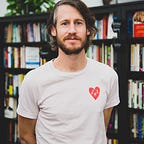Don’t “Be a Man.” Be a Feely Human.
Hi. My name is Non Wels. I am a recovering anorexic.
I am 37 years old.
And I am a human. As we all are.
I suppose I should say that I am also a man, which I feel weird voicing. It’s not the admitting to my gender part. It’s the declaration — I am a man — part.
Saying so makes me uncomfortable.
Here’s the thing: I am in wholehearted opposition to the gross, perverted patriarchal gender norms that would lend any power or intrinsic value to that “I am a man” declaration.
I am a man, yes. Small m. I’m also, above everything, a feely human who nearly died from bottling up my feely grounding in this world.
In this context of eating disorders, I think it’s integral to call out my gender as both a means to dispel the myth that it’s rare for men to have eating disorders (it is wholly not; about 10 million men in the United States alone are affected by an eating disorder), and as a way to break free of the stigma that boys and men somehow need to ignore or compartmentalize their feelings, and just “man up” or “be a man.”
Yuck.
Look, I get it. We as boys were taught, sometimes directly, mostly indirectly — by our peers, our cultural artifices, our parental figures, our societal constructs, our media sources — to be tough, aggressive, and competitive. We were taught to be beacons of strength. We were taught to be kings.
Not, however, as contextless traits, but as insidious holdstrongs in a war against emotional vulnerability.
We are NOT insidious holdstrongs (strongholds :D) in a war against emotional vulnerability. We are feely humans. We are men.
Within the context of mental health (and ALL THE PLACES pretty please?), these archaic notions of manhood need to be distinguished; they need to go away.
Why?
Because feelings are human. And anorexia is a human disorder.
I never thought I’d develop an eating disorder, let alone almost die from one. But I did. And I’m here to describe that journey in part, from the perspective of a feely boy who once felt so out of control he found deep, life-altering solace in the control he had over the food he put into his body — small, precise, precious morsels of caloric retribution.
I was 19 years old when my anorexia started.
But the starting place wasn’t food, which is to say it wasn’t about the food. The food, those precise cubits of caloric intent, were just the mechanism I used to starve myself. And that starving was my boomstick against an unbridled anxiety and depression fostered early in childhood, and then later shocked into overdrive during a period in which I attempted to mediate my parents’ marriage.
For me it was about control.
And a severe lack of emotional insight and clarity.
I didn’t know how to feel my emotions. I didn’t have a name for them. I didn’t have the tools to recognize what the hell was going on.
In early life, I built what I called my Heart-Guard (you can read all about that here in my story), a protective measure, a safety net, a survival technique.
My Heart Guard saved me from the anger and violence of my father.
It helped when my introverted self felt scared, nervous, anxious.
But my Heart Guard also nearly killed me.
It helped me for a time, but I learned — over the course of ten years, through therapy, through the doctor telling me my heart would stop, through the self-harm and suicidal ideation, all the way down to the 118 pounds I fell — my Heart Guard wasn’t going to help me now.
It just couldn’t. It can’t.
I needed to feel the things I was feeling, however painful and disturbing and confusing. I needed to find the path inward. I needed to accept that all of my stirring, all the gnashing, all the emotional mayhem was valid and real.
I needed to know that my anorexia was part of me — is part of me.
I wouldn’t be here today if I hadn’t figured that part out.
The man I am today is one who is grateful for his feelings, appreciative of the often overwhelming emotions.
The man I am today is one who is in recovery from anorexia, a serious mental health disorder so many of us struggle with.
The man I am today is in love with a heart that will never be shut again.
My heart, dear men, is open. It’s open to you, and to each of us.
For we are men, surely. But, above all, we are feely humans — together.
And together, through the actions of our hearts, through our compassion and empathy and vulnerability, we will change the world.
And together, through the actions of our hearts, through our compassion and empathy and vulnerability, we will change the world.
You want to change the world with me? I’d love to be a safe space for your vulnerability, your open heart, your feely humanity, in The Feely Human Collective.
Hugs,
non
